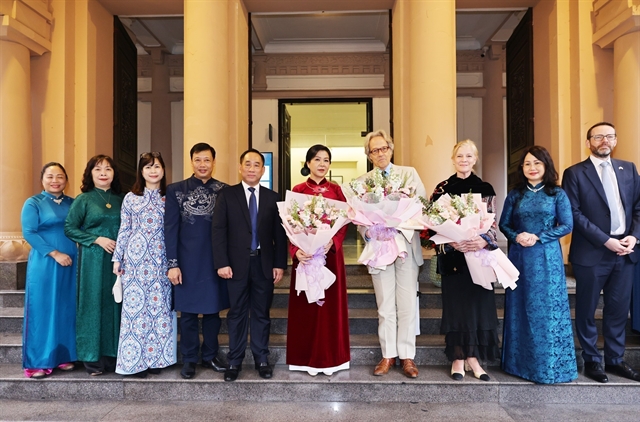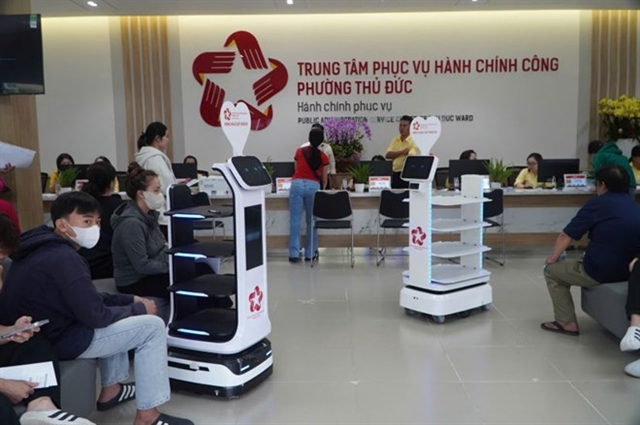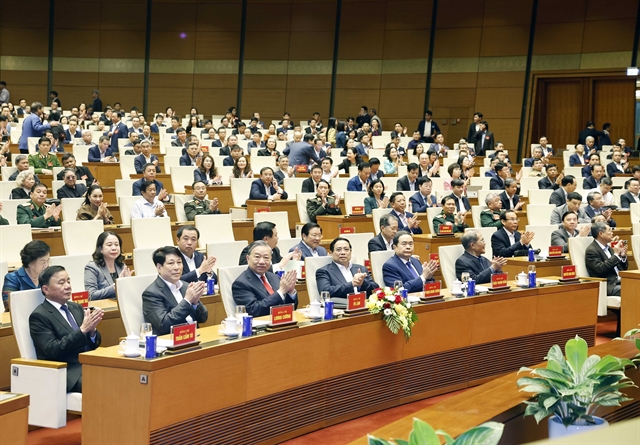 Politics & Law
Politics & Law

 |
| Digital transformation brings greater convenience, speed, and ease to everyday life. Photo tuoitre.vn |
HCM City is moving boldly to realise its vision of a smart metropolis — one where technology, innovation, people-centred governance, and accountability form the foundation of a transparent and efficient administration.
With both its Provincial Innovation Index (PII) and Digital Transformation Index (DTI) ranking in the national top two, the city is redefining how local government operates in the digital age.
Since the introduction of its two-tier local government model in mid-2025, the city has accelerated the digitalisation of its entire administrative machinery.
The goal is not only to simplify bureaucracy but to transform how public services are delivered to citizens and businesses alike.
Central to this transformation is the Document Management and Administration System, connecting all 168 communes, wards and districts across the city.
The system enables every official document — incoming, outgoing or internal — to be digitised and processed online, replacing paper files that once clogged offices and slowed procedures.
“The platform acts as the bloodstream of the city’s administrative system,” said Võ Thị Trung Trinh, director of the HCM City Digital Transformation Centre.
“It ensures seamless coordination from the top level down to the grassroots, and connects directly with the National Public Service Portal for consistency in service delivery.”
At Diên Hồng Ward, 100 per cent of civil servants now work in the digital environment. All meetings, assignments and performance tracking are done online, accessible from computers, tablets or even mobile phones.
“It took time for staff to adapt,” said Hà Tuấn Phương, the ward’s Vice Chairman of the People's Committee (local government body). “But once they became comfortable with digital tools, productivity and response times improved dramatically.”
Across the city, nearly 85 per cent of administrative procedures are now processed online, with some wards like Sài Gòn and Diên Hồng reaching full digital coverage.
The shift has saved both time and money, reducing printing and processing costs by an estimated VNĐ60 billion (US$2.3 million) per year while boosting transparency and accountability.
Digital tools, real impact
While local government is laying the foundation for a digital government, it is at the grassroots level where digital transformation truly comes alive — in the wards and communes where residents interact directly with technology.
In Thủ Đức Ward, two humanoid robots now greet visitors at the Administrative Service Centre. Programmed to answer questions, provide guidance, and even serve water, the robots make the public service process friendlier and more efficient.
“The robots represent our determination to become an innovative urban area,” said Mai Hữu Quyết, secretary of the ward’s Communist Party Committee. Similar pilot projects have been rolled out in An Khánh, Phú Nhuận and Phú Mỹ wards, each investing around VNĐ300 million ($11,800) in robotic systems that help citizens navigate administrative procedures.
For local resident Nguyễn Hữu Khánh, the experience was memorable. “The robot explained exactly what documents I needed for my grandson’s birth certificate and led me to the right counter,” he said. “It’s convenient, efficient and surprisingly warm.”
But the innovation does not stop with robots. In Nhiêu Lộc Ward, artificial intelligence (AI) has become a “digital adviser” for civil servants.
Integrated directly into administrative workflows, the AI system scans uploaded documents, extracts data, checks for errors, and alerts staff to missing information before final submission.
“AI doesn’t replace people,” explained Phạm Đăng Khoa, vice chairman of the People's Committee of Nhiêu Lộc Ward. “It frees them to focus on more complex work and ensures that each case is processed quickly and accurately.”
To make sure no citizen is left behind in this transformation, the city has launched Community Digital Technology Teams.
These local volunteers visit homes, teach digital literacy, and help residents activate online identification accounts to access public services.
“Digital transformation is now a driving force, not a slogan,” said Nguyễn Hùng Hậu, chairman of the People's Committee of Xuân Hòa Ward.
“For a smart government to work, we need digital citizens. The community tech teams are helping us bridge that gap.”
 |
| Two robots have been placed at the Thủ Đức Ward Public Administrative Service Centre in HCM City to assist citizens. Photo mst.gov.vn |
Digital tools, real impact
Despite its impressive progress, HCM City still faces obstacles — particularly in human resources and digital skills among citizens.
According to Nguyễn Tấn Phong, deputy director of the city's Department of Home Affairs, the city currently has a surplus of around 1,065 administrative staff, mostly in clerical roles, but a shortage of nearly 965 professionals in specialised areas such as finance, urban planning, health care, and information technology.
At Bà Điểm Commune, where the population exceeds 200,000, workloads are intense. Each civil servant handles between five and seven responsibilities and often works weekends.
“We’ve had almost ten people resign because of stress,” said Trần Thúy Hương, vice chairwoman of the People's Committee of the commune.
“If we could assign deputy managers to specific fields, it would ease the burden and improve oversight.”
At the same time, many citizens remain hesitant to embrace online services.
“Although our ward processes about 85 per cent of administrative requests online, some residents — especially the elderly and small traders — still prefer submitting paperwork in person,” said Nguyễn Thị Thu Dung, head of the Social Affairs Office at Xuân Hòa Ward.
This “digital hesitation” contributes to what experts call a digital skills gap — a divide between those who are comfortable with technology and those who are not.
“A digital government cannot succeed without digital citizens,” noted Nguyễn Tuấn Anh, a public administration specialist.
“HCM City must lead the country in teaching digital skills, from schools and vocational centres to community halls.”
The city has therefore launched an ambitious "Digital Literacy for All" programme, informally known as “Digital Mass Education”.
The campaign, costing approximately VNĐ45 billion ($1.77 million) each year, provides free training on how to use public service apps, verify digital identities and access online government platforms.
Stronger skills, better service
Alongside citizen education, the city is investing heavily in training its own workforce.
More than 40,000 civil servants and public employees have received courses in artificial intelligence and digital management.
“Our goal is simple,” said Nguyễn Văn Được, chairman of the HCM City People’s Committee (municipal government). “Every investment in technology must translate into better services and higher satisfaction for citizens.”
Experts agree that the city’s approach combines pragmatism with vision.
“The city has a clear, data-driven roadmap,” said Trần Quý, PhD, director of the Việt Nam Institute for Digital Economic Development. “It is not just setting goals but implementing measurable actions based on real local conditions.”
Vũ Tuấn Anh, a digital strategy expert, added that a leadership mindset was the key. “Technology itself is not decisive — the determination of leaders is. In HCM City, leadership commitment is what turns policy into performance.”
Built for convenience
As the city continues its journey towards 2026–2030, digital transformation has become a cornerstone of governance reform.
The focus has shifted from digital tools to tangible outcomes: efficiency, transparency and satisfaction.
Future plans include integrating massive datasets on population, land, and social welfare into a unified platform to reduce manual workloads by at least one-third, and developing a 24/7 virtual assistant capable of providing real-time support for residents.
Meanwhile, weekend support desks at commune offices — staffed by rotating civil servants — are helping citizens navigate online forms and activate digital accounts, building familiarity and trust in the digital environment.
“The ultimate goal of every reform,” Chairman Được emphasised, “is the happiness and convenience of our citizens. A government’s success is measured not by how much it digitalises, but by how much it serves.”
After only a few months of operating under its new two-tier system, the city has demonstrated that digital transformation is not merely about software or systems — it is about a cultural shift toward openness, responsiveness, and innovation.
Despite remaining challenges, the city’s trajectory is clear: to become a high-performing, human-centred smart metropolis, powered by data, guided by integrity, and built around the needs of its people.
From the introduction of service robots to community-led digital literacy programmes, the city is not only digitalising governance — it is redefining what a truly smart city means in Việt Nam. – VNS




